Pre-employment screening helps recruiters find the best candidates by assessing skills and qualifications before making a hiring decision.
This blog post compares Adaface and Equip, highlighting their features to help you choose the right assessment platform for your hiring needs.
Explore this post with:
Table of contents
How does Adaface work?
Adaface is a conversational AI-powered assessment platform designed to help recruiters identify top talent effectively. It offers a wide range of tests, from coding to personality assessments, ensuring a holistic evaluation of candidates.
Recruiters use Adaface to create customized assessments tailored to specific job descriptions. This feature allows for a more accurate evaluation of a candidate's skills and fit for the role, subtly enhancing the overall hiring process.
Another key use case is Adaface's proctoring features, which ensure the integrity of the assessments. With options like remote proctoring and IP tracking, recruiters can confidently trust the results without worrying about cheating.
Unique features such as Adaface's scenario-based MCQs and support for multiple languages, including French, German, and Spanish, set it apart. These aspects cater to diverse hiring needs, making it a versatile choice for global recruitment.
How does Equip work?
Equip is an assessment platform that focuses on pre-employment testing, offering a selection of aptitude, programming, and cloud-related tests. Users can quickly access their library and assess candidates on various skills to aid in hiring decisions.
To get started, recruiters can create assessments based on the roles they are hiring for. For instance, a company looking for software developers might select programming tests, while one seeking data analysts might prefer cloud or data-related questions.
Some features Equip highlights include a variety of ready-to-use tests, automated scoring to streamline the evaluation process, and a focus on programming and cloud expertise. However, it lacks support for more specialized tests, such as situational judgment or personality assessments.
While Equip provides a good starting point for assessments, it falls short in terms of customizable testing options. The absence of scenario-based questions and personalized test creation may limit recruiters looking for a tailor-made evaluation experience.
Adaface vs Equip: Test libraries
Adaface and Equip both offer vast test libraries tailored to various roles and skills. Adaface stands out with its extensive range including programming, aptitude, language, finance, and AI tests, whereas Equip focuses primarily on programming and aptitude tests.
Recruiters benefit significantly from these test libraries as they help in identifying the right fit for the job before proceeding to interviews, thereby reducing hiring time and improving candidate quality.
Adaface's test library
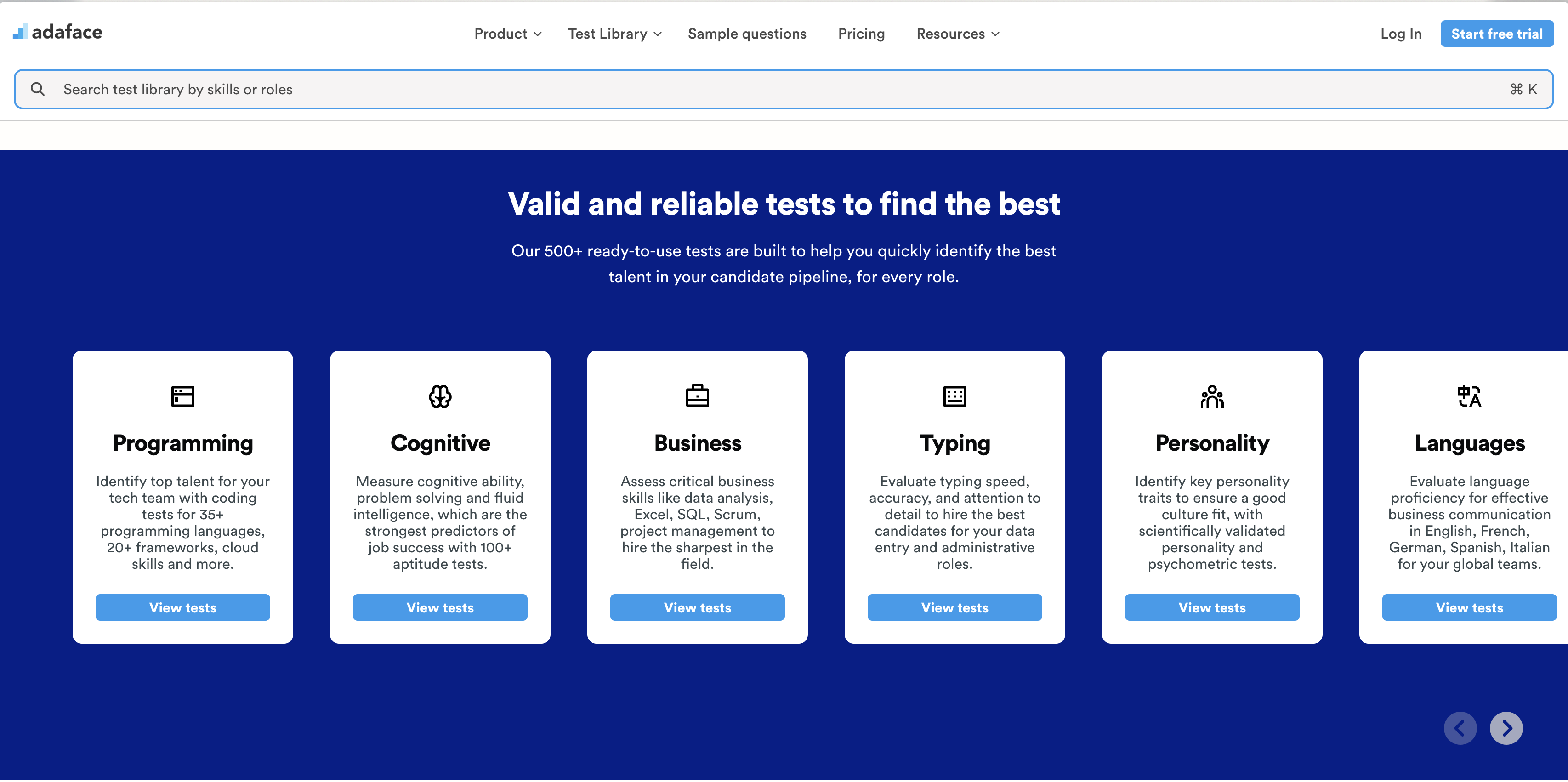
Adaface's test library includes over 500+ skills, featuring specialized tests such as programming tests, artificial intelligence tests, and role-specific tests. Additionally, there are tailored tests for accounting/finance, personality tests, and more.
Recruiters use Adaface's test library to assess candidates for various roles with customizable and scenario-based questions, ensuring a precise match for the job description. This leads to more accurate evaluations and better hiring decisions.
To see Adaface's library in action, simply select a relevant test from categories like IT, language tests, or typing tests, and customize it based on your needs. With options to add or create custom questions, it is easy to tailor assessments to your specific requirements.
Equip's test library
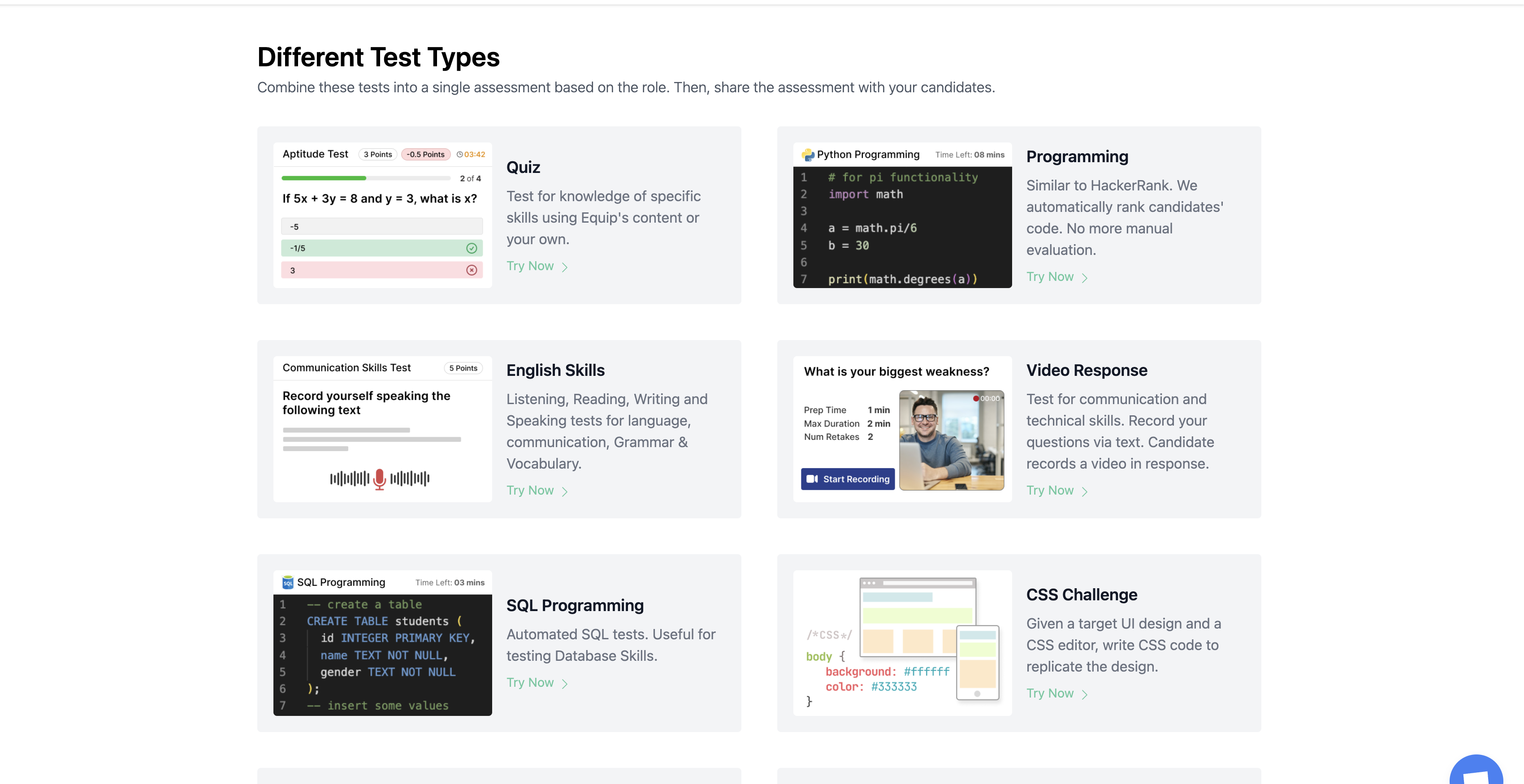
Equip offers a selection of programming tests and aptitude assessments, but their library lacks variety in job-specific and situational judgment tests. While they do provide English language tests, options for other languages and skills are limited.
A selling point for Equip's test library is its programming assessments, which are designed to evaluate coding abilities through multiple-choice questions and coding tasks. This can be particularly useful for organizations that need to gauge technical skills quickly.
However, missing from Equip's offerings are the diverse types of assessments that can cater to various job roles and skills, such as personality tests or custom question capabilities. This may leave employers wanting more flexibility in their candidate evaluations.
Comparison of test libraries
Adaface vs Equip: Business, Marketing and Ops Roles
When hiring, you need to assess a candidate’s full range of on-the-job skills to see if they align with your team and workload.
Look for a platform that offers a range of tests that covers the actual skills required in your job description. You’ll also want to evaluate candidates’ ability to work with different tools used in your company.
Business, Marketing and Ops Roles with Adaface
Adaface offers a number of tests to help find the perfect candidate.
We offer a range of 500+ tests (Excel, project management, design, aptitude, psychometric, language proficiency and typing skills) to help you find your ideal candidate. These range from custom tests for tools (such as Excel simulator), aptitude (like Numerical reasoning and data analysis), psychometry and role-based skills (finance, accounting etc).
In addition, you can easily customize tests to the type of work your business does. This way, you can test whether a candidate can keep up with your team’s workload.
Hiring Business, Marketing and Ops Roles with Equip
Equip offers an array of assessments tailored to non-developer roles, focusing primarily on aptitude and language skills. Their test library is equipped with programming and cloud tests, but when it comes to non-tech roles, the options are limited. English language assessments are available, but the variety of tests for broader business roles isn't as expansive.
For hiring managers seeking ready-to-use solutions, Equip provides a selection of pre-built tests. This makes it a convenient tool for those interested in basic aptitude evaluations or language proficiency checks. However, specific role-focused assessments, especially for diverse non-dev roles, might require more tailored solutions than what Equip currently offers.
While Equip covers some aspects of non-dev hiring, it lacks certain nuanced features. The absence of situational judgment, personality, and business tests limits its scope for comprehensive role-based hiring. Furthermore, the inability to customize tests or add custom questions could be a hurdle for companies with unique role-specific requirements.
Adaface vs Equip: Developer hiring
When hiring developers, assessing both their coding skills and problem-solving abilities is crucial. A well-rounded evaluation helps recruiters find candidates who can meet their team's technical demands and adapt to new challenges.
Both Adaface and Equip offer a variety of tests to evaluate developers. They include coding questions, algorithm challenges, and assessments for specific frameworks. However, each platform has its unique strengths and limitations.
Hiring developers with Adaface
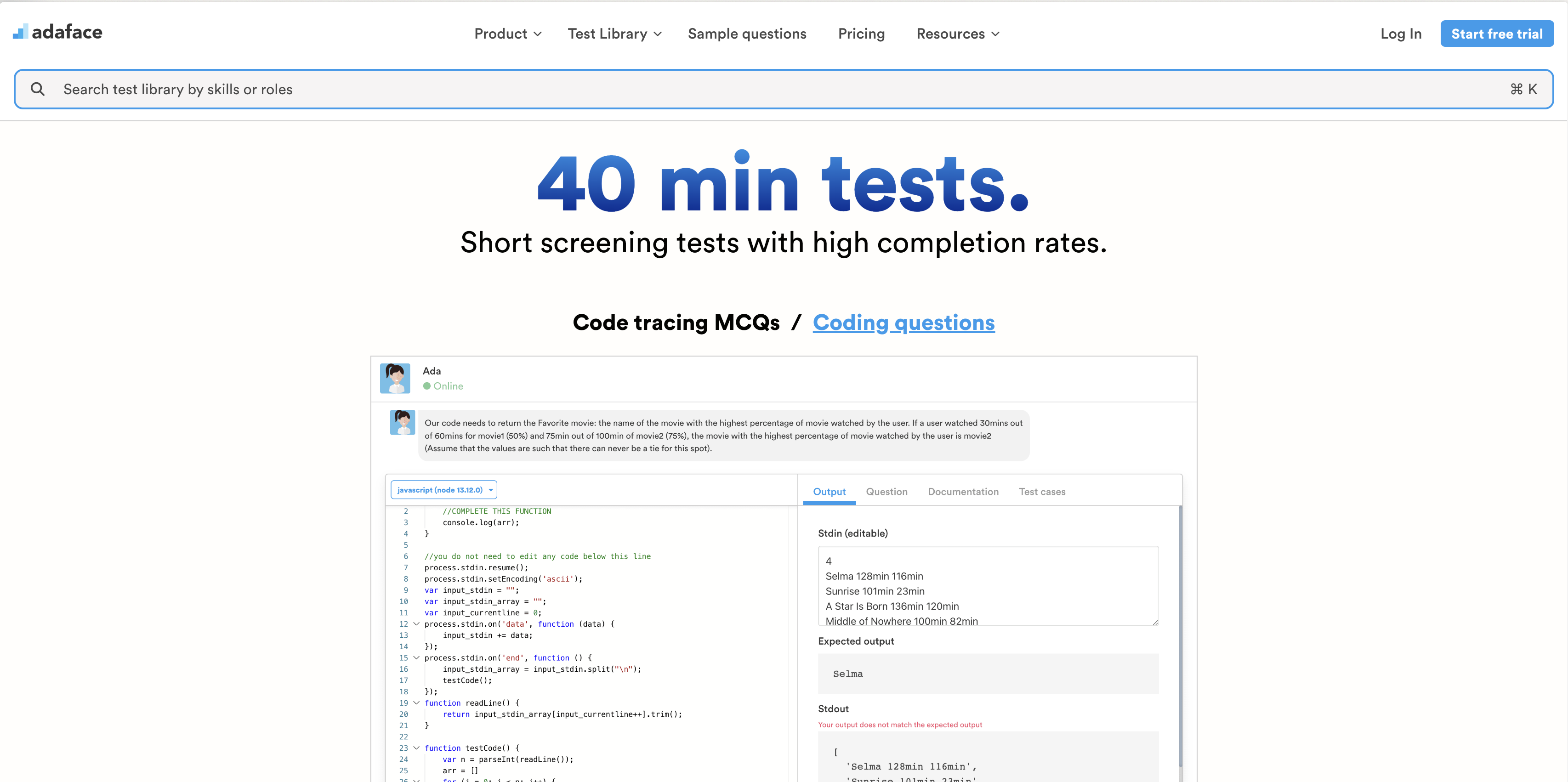
Adaface provides a comprehensive range of functionalities for hiring developers. These include:
- Coding questions in multiple programming languages such as Java
- Web framework assessments
- Mobile framework questions
- Data Structures and Algorithm challenges
- Code playback feature
- Automated scoring
- Custom coding questions
Recruiters use Adaface to hire developers because it combines both MCQs and coding questions. This ensures a balanced assessment that tests for hands-on coding experience and theoretical knowledge simultaneously.
Additionally, Adaface's code playback feature allows recruiters to review a candidate's coding process in detail, ensuring a thorough evaluation. The platform's Pre-Employment Assessment Test Library covers over 500 skills, providing ample resources to identify the perfect candidate.
Hiring developers with Equip
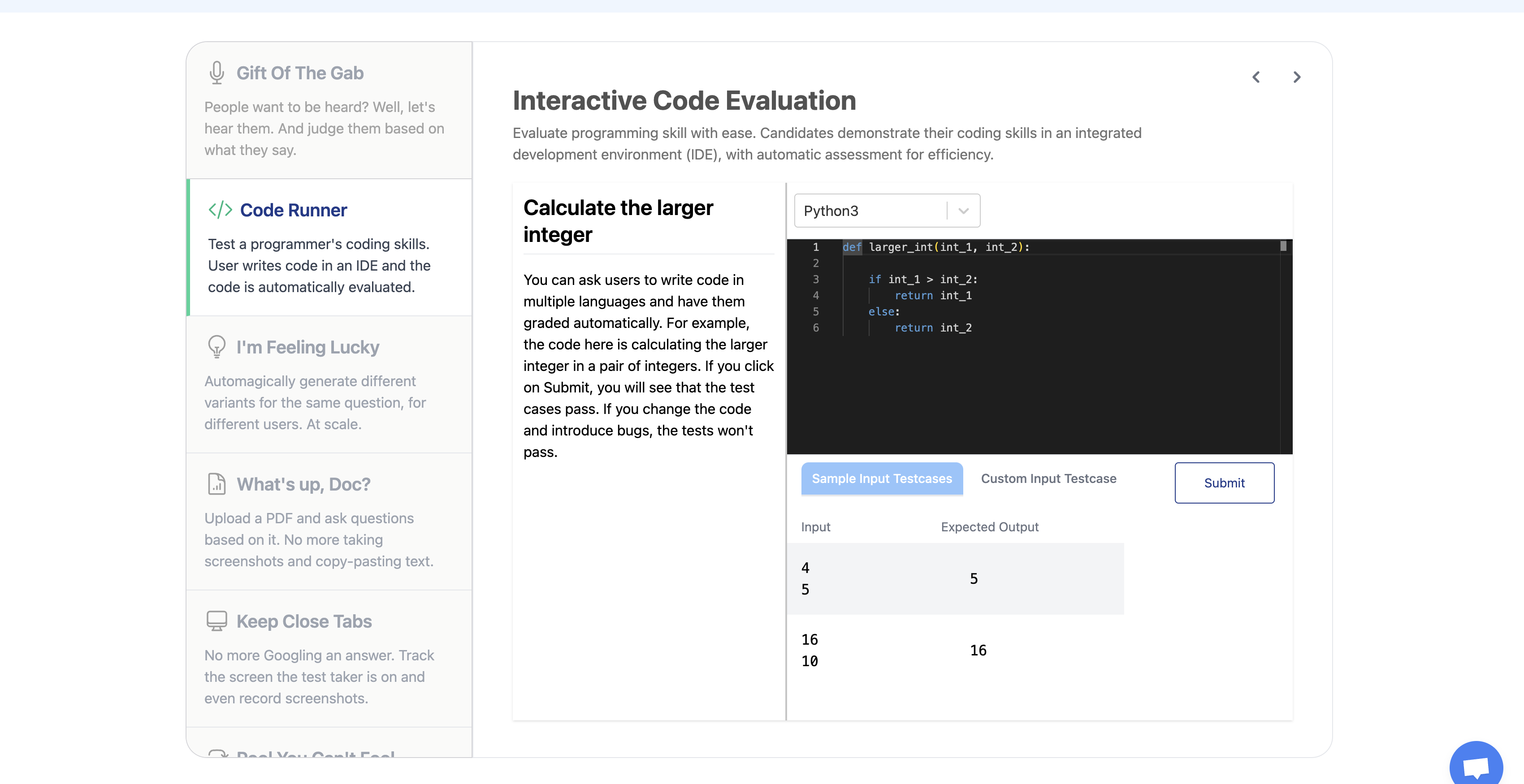
Equip offers a variety of programming assessments, including coding questions for multiple languages and frameworks. They also include data structures and algorithms, which are essential for evaluating a developer's technical skills during the hiring process.
Their test library allows hiring managers to create tailored assessments using a mix of coding questions and scenario-based MCQs. This flexibility lets employers design tests specifically suited to their needs, helping to gauge a candidate's hands-on coding abilities effectively.
However, Equip lacks some features that enhance the evaluation process, such as code playback and custom coding questions. These elements are crucial for providing deeper insights into a candidate's coding style and problem-solving approach.
Comparison of developer hiring features
Adaface vs Equip: Candidate experience and company branding
Candidate experience and company branding are key ingredients for attracting top talent. A positive experience can lead candidates to share their enthusiasm about your company, while a negative experience could be damaging to your reputation, even before they’ve set foot in the door.
When evaluating assessment platforms, it's important to consider features like mobile accessibility, easy navigation, and customization options. A platform that feels welcoming and engaging helps candidates feel valued, creating a favorable impression that reflects well on your brand.
Candidate experience and company branding with Adaface
Adaface's conversational assessments provide a friendly, engaging environment for candidates. This approach not only aids in reducing anxiety but also promotes better performance as candidates feel more at ease, akin to having a chat rather than facing a traditional, intimidating test.
With customizable branding options, Adaface allows you to incorporate your company logo and brand colors into the assessment interface. This not only reinforces your brand identity but also cultivates a sense of familiarity and trust during the assessment process.
Adaface also offers customized email templates for invitations and rejection notices, enabling seamless communication that aligns with your company's voice. A thoughtful touch like this enhances your employer brand and helps maintain positive relationships with candidates, regardless of the outcome.
Candidate experience and company branding with Equip
Equip's candidate experience could use some polishing. Their platform isn't mobile-friendly, making assessments less accessible for candidates on the go. Email support is available, but the lack of a conversational interface might make the testing process feel a bit archaic.
From a company branding perspective, Equip allows for some customization. Recruiters can add their company logo and brand colors to the assessment platform. Customizable invitation templates are also available, which helps maintain brand consistency in candidate communications.
While Equip offers some useful features for candidate experience and company branding, the absence of mobile support and a conversational interface could impact how modern and engaging the platform feels to candidates. Additionally, it's unclear if there are help documentation and customizable shortlist and rejection templates, which are important for a seamless candidate journey and robust branding.
Adaface vs Equip: Anti-cheating features
Cheating in pre-employment testing can give some candidates an unfair advantage and undermine the reliability of their results. Strong anti-cheating measures like IP-address monitoring and webcam snapshots ensure tests are fair and the results accurately reflect candidates’ abilities.
Anti-cheating features of Adaface
Adaface offers a range of anti-cheating features to maintain the integrity of your assessments. These include:
- Non-googleable scenario-based questions
- Webcam proctoring
- Browser tab tracking
- Location logging
- IP and device fingerprint proctoring
- Copy-paste protection
- Full-screen monitoring
- Chat GPT protection
- Large question bank
- Plagiarism detection.
One of the standout features is webcam proctoring, which ensures the candidate is present throughout the test. Additionally, IP and device fingerprint proctoring help flag any irregularities if two candidates take the test from the same location or device. These measures add layers of security, making it difficult for candidates to game the system.
Adaface also employs copy-paste protection and no-googleable questions, meaning candidates can't simply search online for answers. Combine this with a vast question bank and plagiarism detection, and you have a robust system that ensures fair and accurate assessments. For more details on how Adaface ensures test integrity, check out our complete guide on online proctoring or explore our proctoring features.
Anti-cheating features of Equip
Equip offers several proctoring features aimed at maintaining test integrity. These include web proctoring, which tracks browser tabs and windows, and webcam proctoring to monitor candidates during the test. Additionally, Equip disables copy-paste functions and mandates full-screen mode to limit cheating opportunities.
These features can be particularly useful in scenarios where recruiters need to ensure candidates are focusing solely on the test. For example, webcam proctoring ensures that the test taker is the same person throughout the exam, reducing the risk of proxy test-taking.
However, Equip lacks some key anti-cheating measures such as IP proctoring and device fingerprinting, which can be useful for identifying suspicious behaviors like multiple candidates using the same device. Also, it doesn't offer protection against candidates using tools like Chat GPT during the test.
Comparison of anti-cheating features
Adaface vs Equip: Pricing and free trial
When evaluating assessment providers, pricing is a key consideration for recruiters. Different platforms offer various pricing models, often tailored to suit different hiring needs and scales.
Adaface pricing
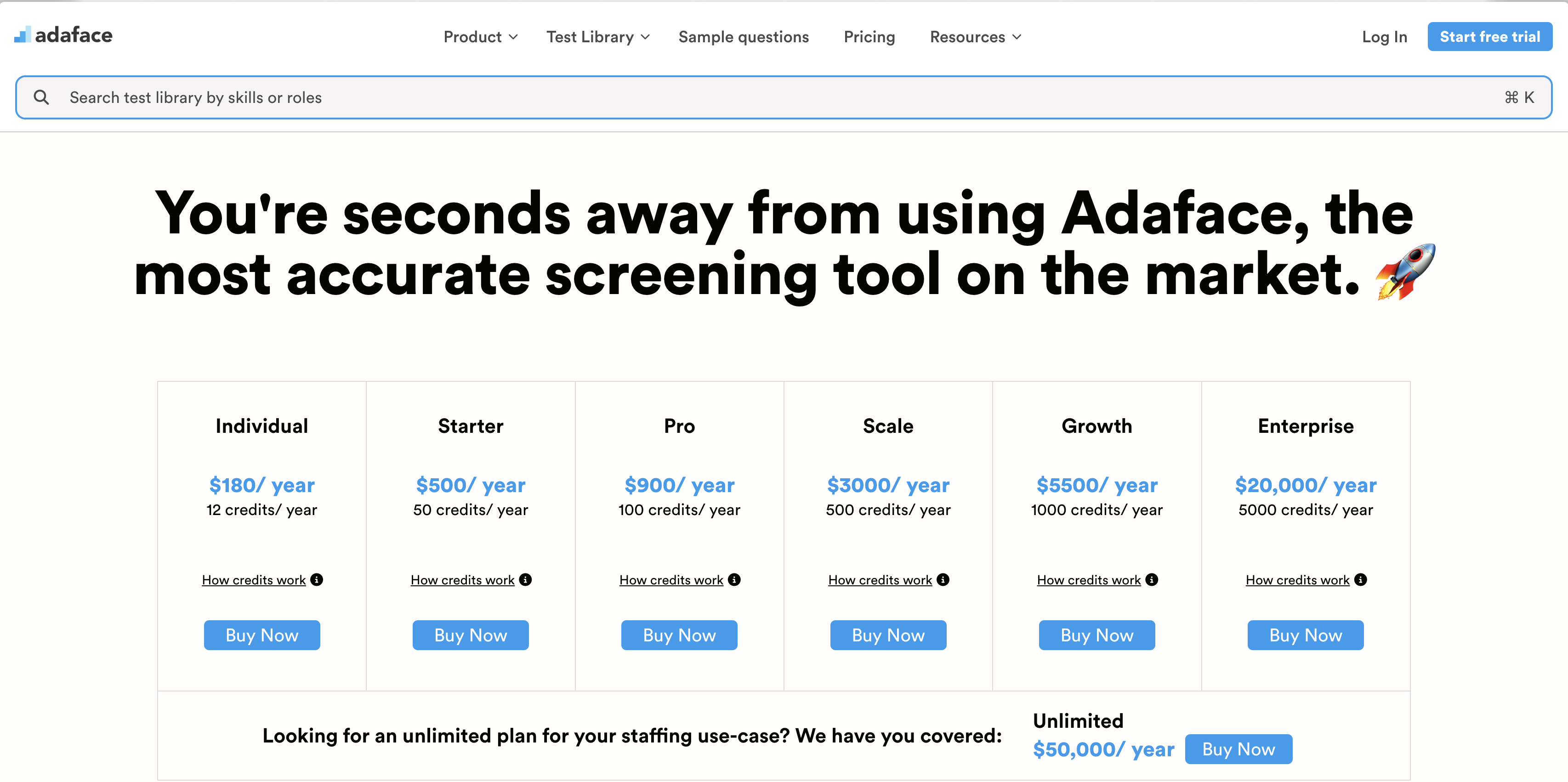
Adaface offers a range of flexible pricing plans to accommodate companies of all sizes and needs. Our plans include credits-based pricing, which ensures you only pay for what you use.
Here’s a quick overview of Adaface’s pricing plans:
- Starter: $500 for 50 credits
- Scale: $3000 for 500 credits
- Growth: $5500 for 1000 credits
- Enterprise: $20000 for 400 credits
- Unlimited: $50000 per year for unlimited candidate assessments
For more detailed information, you can visit our Adaface Pricing page. Companies can sign up easily and explore all features before making a decision. Plus, we offer a free trial to get you started.
Equip pricing
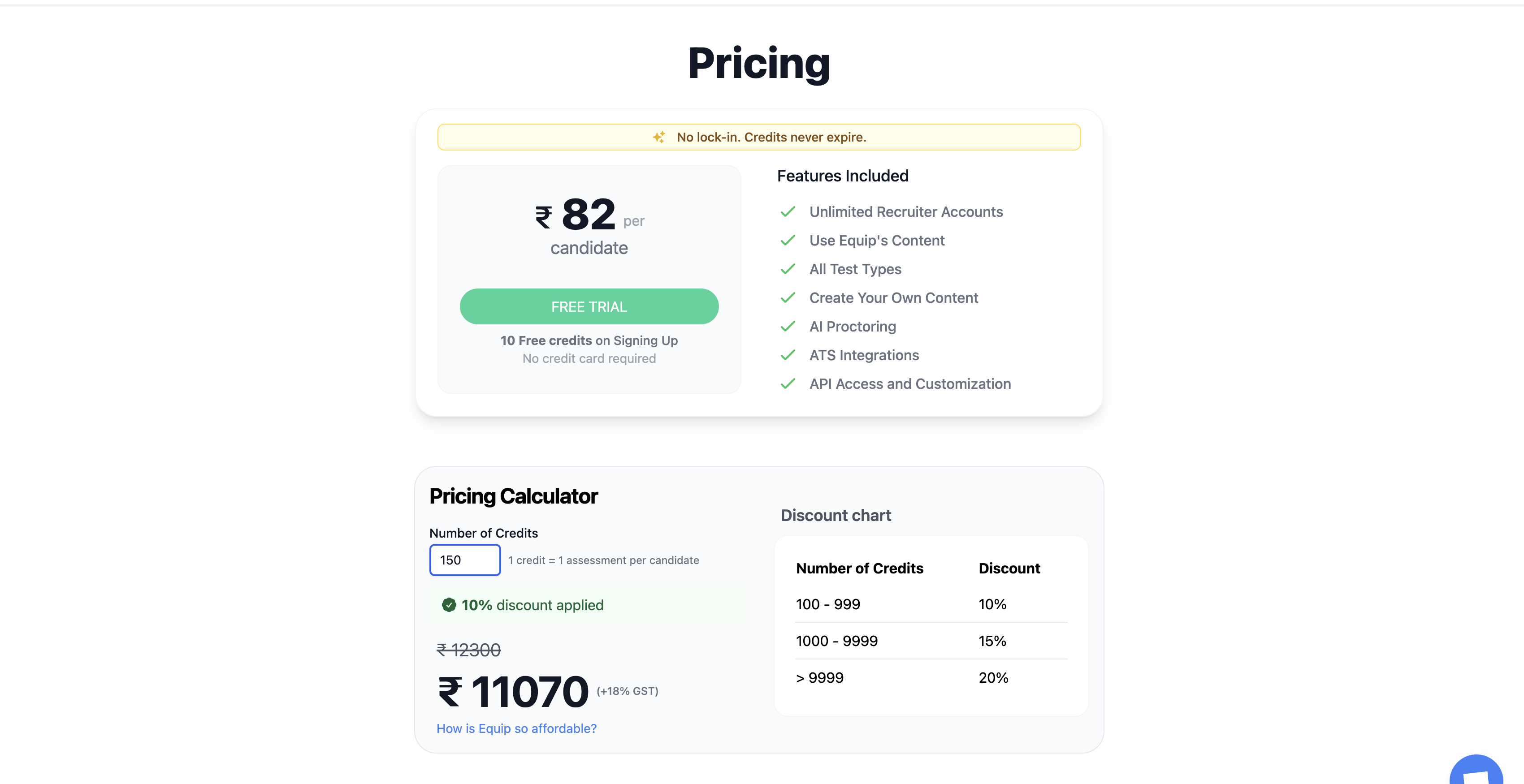
Equip offers a straightforward pricing structure, making it easy for potential users to gauge their costs. Their plans are outlined as follows: - Starter Plan: $1 per candidate, which is one of the most affordable options in the market, but lacks access to a quality test library. - Growth Plan: $5,500 for 1,000 credits, catering to bigger hiring needs. - Enterprise Plan: $20,000 for 400 credits, aimed at larger organizations. However, they do not provide an unlimited plan, which might be a dealbreaker for companies with high-volume hiring needs.
While Equip's pricing is transparent, it lacks the flexibility of unlimited assessments which can be a game-changer for companies on a growth trajectory. The absence of an individual plan could also be limiting for solo recruiters or smaller teams who might want to test the waters before fully diving in. Plus, without an easy way to explore all features upfront, potential users might miss out on truly understanding the platform's capabilities.
Comparison of pricing
Adaface vs Equip: Scorecards, reporting and analytics
Recruiters need a platform with robust scorecards, reporting, and analytics features to make informed hiring decisions based on candidate assessments. An ideal solution should provide detailed insights into each candidate's performance across various skills and allow easy comparisons between candidates.
Adaface scorecards, reporting and analytics
Adaface offers comprehensive scorecards that give a 360-degree view of each candidate's performance. These scorecards provide a skills profile that highlights the candidate's strengths and weaknesses across different areas. Additionally, Adaface offers benchmarking capabilities, allowing recruiters to compare a candidate's performance against industry averages and their company's internal benchmarks.
One standout feature of Adaface's scorecards is the skill-wise analysis, which breaks down a candidate's performance in granular detail. This analysis helps recruiters understand the specific areas where a candidate excelled or struggled, enabling them to make more informed decisions during the hiring process.
Adaface's reporting capabilities are equally impressive. Recruiters can download reports in various formats, including PDF, Excel, and CSV, making it easy to share candidate information with the hiring team. The platform also offers public reports with unique links, allowing recruiters to share scorecards with clients or external stakeholders without requiring login credentials.
Equip scorecards, reporting and analytics
Equip offers a range of reporting features, including automated scorecard generation and the ability to share reports in PDF format. Users can benchmark candidates and view their skills profile, which gives a snapshot of performance across various skills.
For example, hiring managers can utilize Equip's reports to quickly assess where a candidate stands compared to their peers, allowing for more informed decisions during the hiring process.
However, Equip's reporting lacks a detailed skill-wise analysis that breaks down performance by category. This means recruiters may miss out on insights regarding specific strengths and weaknesses of candidates, which can be critical for decision-making.
Comparison of scorecards, reporting and analytics
Adaface vs Equip: Enterprise and startup friendliness
An ideal product for enterprises and startups should offer seamless integration with existing systems, ensure data security, and provide flexibility to scale as the company grows. These features make it easier for businesses to streamline their hiring processes and maintain compliance with industry standards.
Adaface's enterprise and startup friendliness
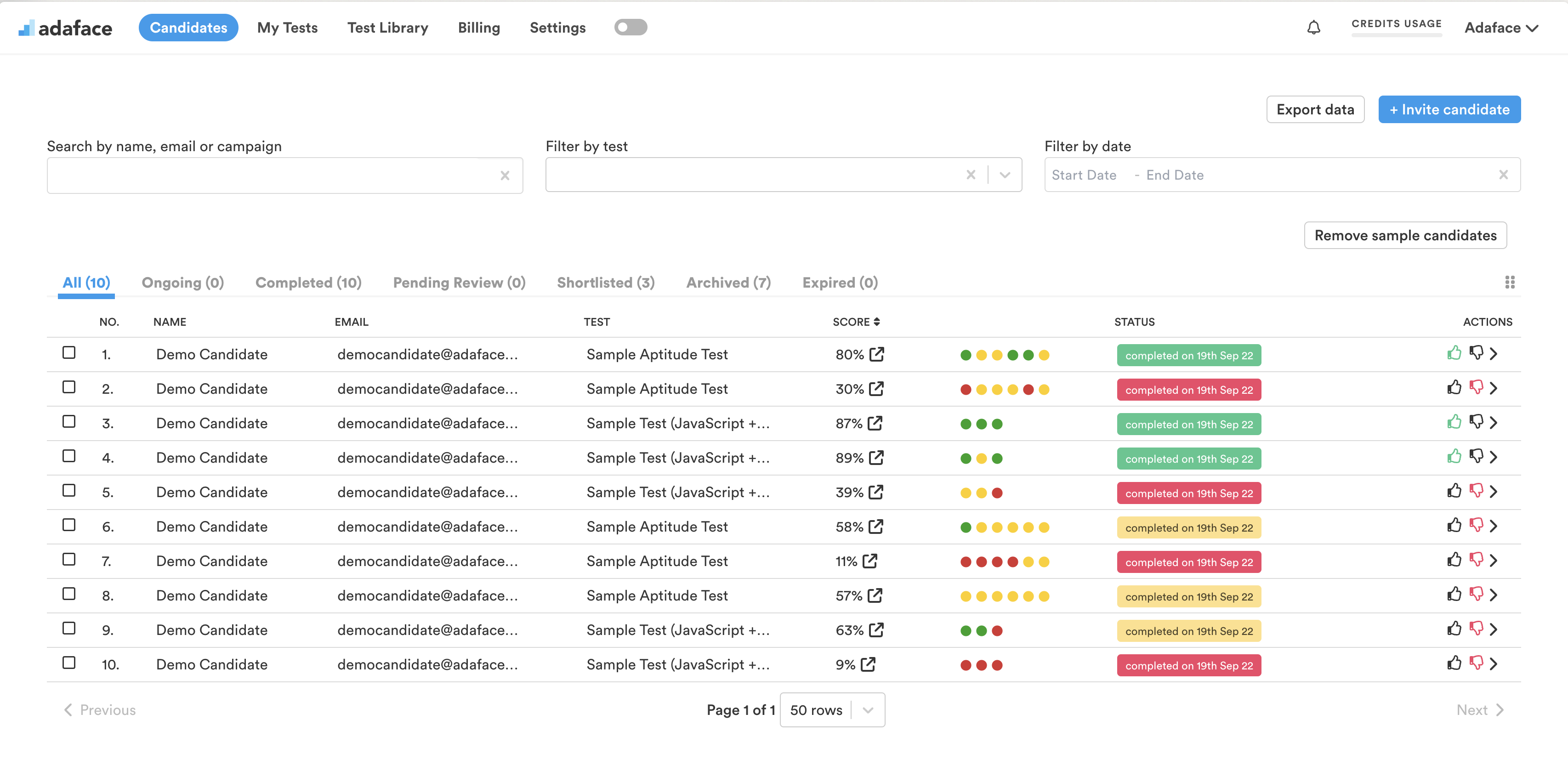
Adaface shines when it comes to enterprise friendliness, offering GDPR compliance and the option for custom data location support. This ensures that enterprises can store their data securely and comply with local laws, a feature not available with all competitors.
For startups, Adaface provides unlimited team seats across all plans, allowing growing companies to add as many users as needed without incurring extra costs. This flexibility makes it an attractive option for small businesses and startups.
Additionally, Adaface offers a Custom API, enabling tighter integration with existing HR systems, a feature not provided by Equip. This flexibility is particularly beneficial for professional services agencies looking to integrate Adaface into their products. Learn more about enhancing your recruitment process with Adaface.
Equip's enterprise and startup friendliness
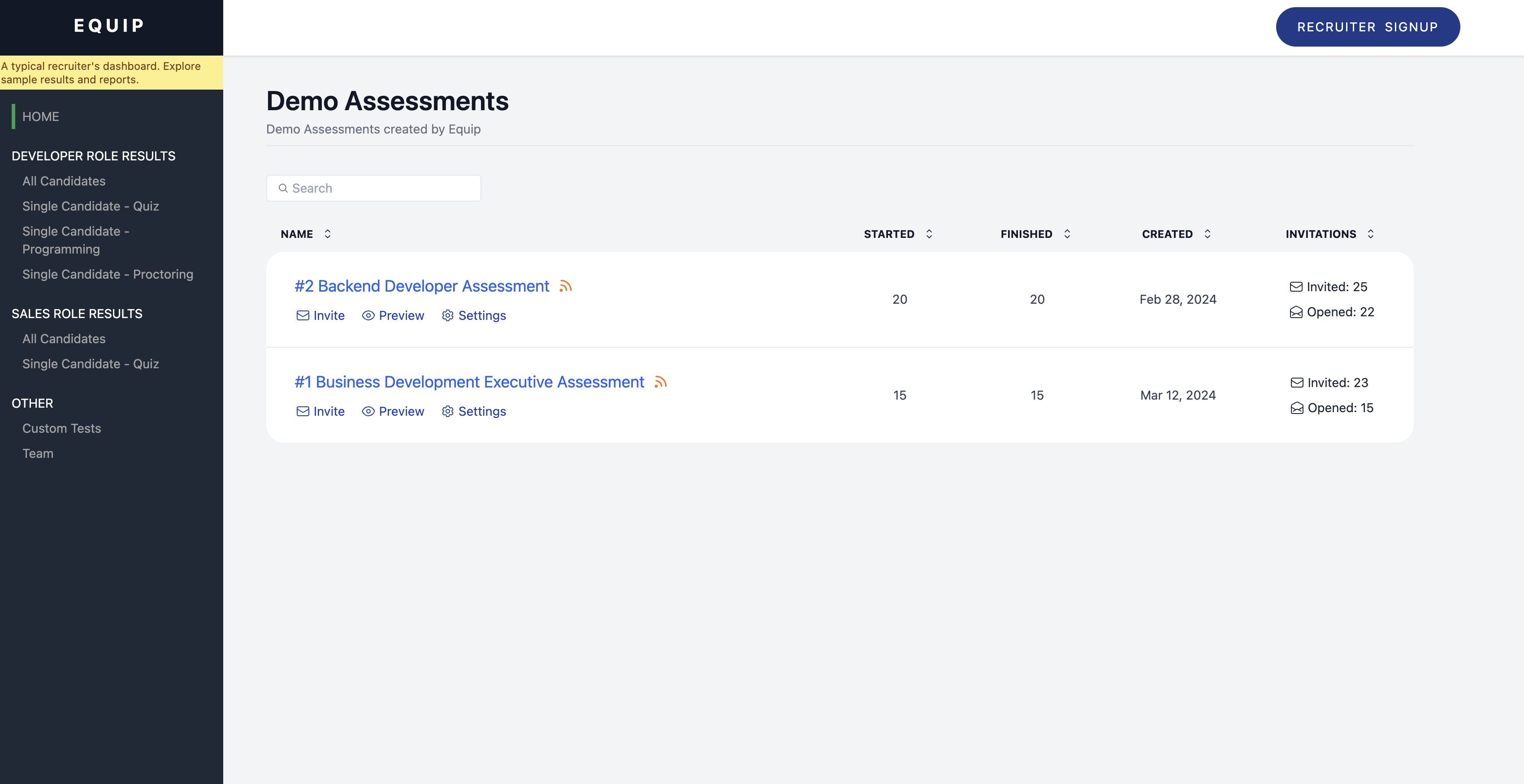
Equip markets itself as a flexible option for both enterprises and startups, featuring ATS integrations, GDPR compliance, and unlimited team seats. While it provides a variety of ways to invite candidates, it lacks custom API support and role-based access, which can be limiting for larger organizations.
For enterprises, the ability to invite a large number of candidates through various channels makes Equip a user-friendly choice for mass hiring events. However, the absence of bulk actions could slow down processes when companies are managing numerous candidates at once, leading to bottlenecks in hiring.
While Equip does offer a solid foundation for organizations, it falls short in providing multiple question sets and the ability to track candidate stages effectively. These gaps can hinder companies looking to streamline their hiring process and gain deeper insights into candidate performance.
Comparison of enterprise and startup friendliness
Adaface vs Equip: Assessment quality control
Quality control in assessments is like a safety net for recruiters, ensuring that the tests they use truly measure what they claim to. It helps in identifying the right candidates while maintaining the integrity and effectiveness of the testing process.
Adaface's quality control features
Adaface employs a rigorous quality control process featuring multiple checks before any question goes live. Every question is crafted through collaboration with psychometricians and subject-matter experts to ensure clarity and relevance.
We also listen to candidate and customer feedback, constantly refining our tests and replacing questions that become too familiar. This way, we're always keeping our question pool fresh and effective for accurate assessments.
With proprietary algorithms working behind the scenes, Adaface ensures that the quality of our questions remains top-notch. Recruiters can trust that our assessments not only evaluate skills but also evolve based on the latest insights. For more information on how we maintain quality, check out our science page!
Equip's quality control features
Equip's quality control process for their assessment platform is not clearly outlined on their website. They use psychometric test theory to measure behavior and personality traits, which means every candidate takes the same assessment.
Due to the standardized nature of their assessment, Equip doesn't offer options for customers to adjust or customize the test. This approach aims to maintain consistency across all evaluations.
It's unclear how often Equip reviews its assessment, updates questions, or incorporates user feedback. The lack of information about question replacement or social listening practices raises questions about the long-term validity of their tests.
Comparison of quality control
Adaface vs Equip: Customer support
When it comes to assessment providers, customer support is the invisible hand that lifts the entire experience. Recruiters need reliable support to navigate the platform smoothly, ensuring a seamless hiring process.
Adaface's customer support features
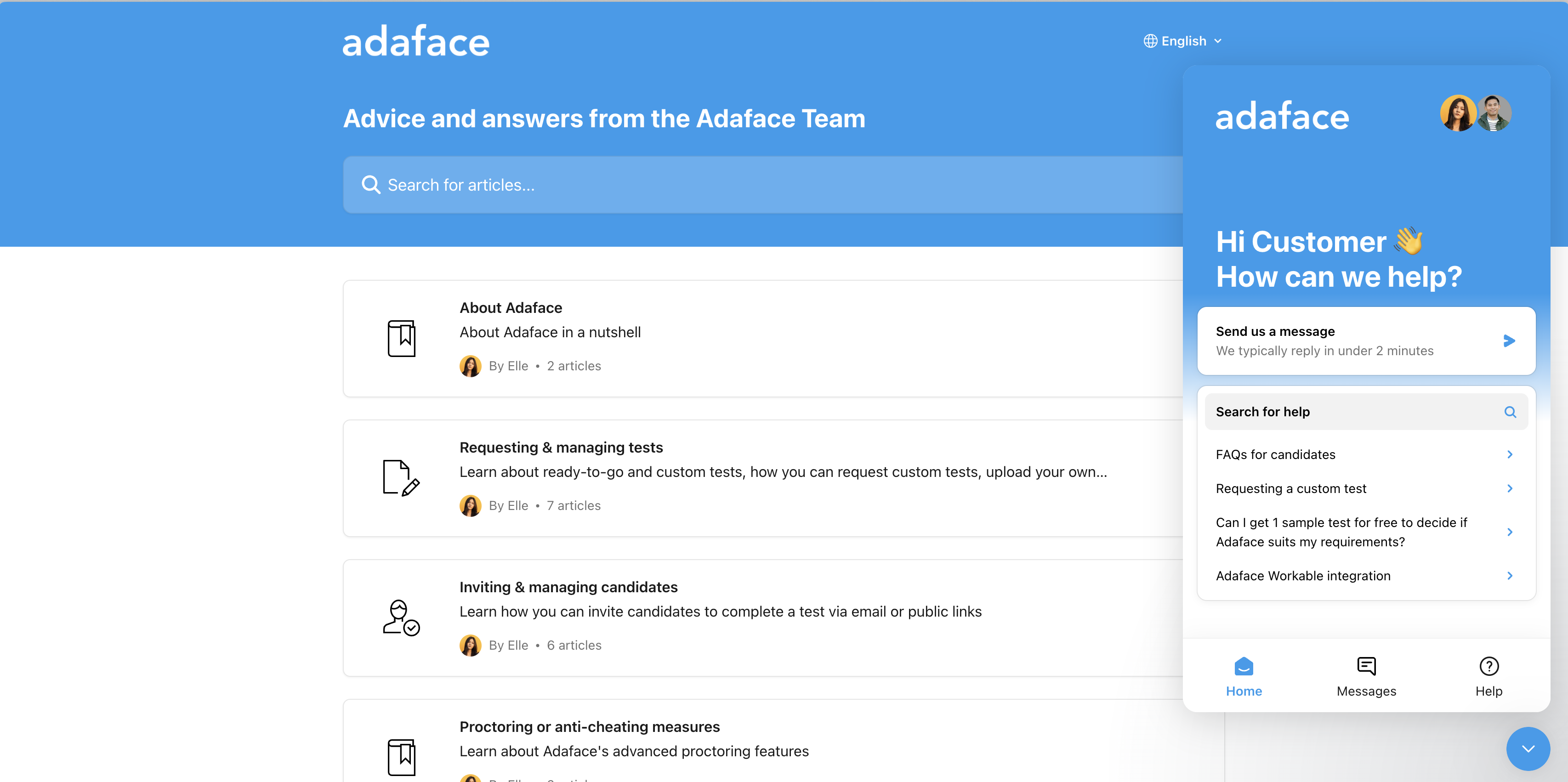
Adaface offers a variety of support features, including live chat and email support, so you can get answers right when you need them. Plus, our Help Center is packed with resources to guide you through every feature and functionality.
For those on higher plans, Adaface provides dedicated priority support, ensuring that your enterprise has a direct line to a customer success contact. This means quicker issue resolution, allowing you to focus on hiring the right talent.
And let’s not forget about our onboarding training! Adaface equips you with personalized sessions, making it easy to master the platform and start crafting assessments that attract top candidates. Explore our Adaface product tour for a deeper dive into our features.
Equip's customer support features
Equip offers email support, live chat, and a help center to assist users. These channels ensure recruiters can find answers to their queries easily.
However, some features like dedicated priority support and training and onboarding remain unclear. Additionally, there's no phone assistance available.
Comparison of customer support
Adaface vs Equip: Final verdict
Both Adaface and Equip offer programming tests, coding questions, and aptitude tests.
Even with these similarities, Adaface stands out with a conversational interface and mobile-friendly support, enhancing candidate experience.
Equip lacks situational judgment, personality, and business tests, which are important for a well-rounded assessment.
Streamline hiring with skill tests
Adaface provides these missing tests, along with custom questions and a personalized approach that tailors assessments to job descriptions.
Pre-employment assessments streamline the hiring process, reducing bias and providing detailed insights into candidates' capabilities.
Using these assessments, recruiters can save time and make informed decisions, ensuring they select the most qualified candidates.
Adaface offers a comprehensive solution with features like remote proctoring and GDPR compliance. To explore our platform, check our pricing plans and start improving your hiring process today.
Adaface vs Equip FAQs
Adaface offers a wide range of tests including programming, aptitude, business, and language tests. Equip primarily focuses on programming and aptitude tests.
Adaface supports custom questions and allows users to add their own. Equip does not offer this feature.
Adaface has comprehensive proctoring features like web and webcam proctoring, location logging, and IP tracking. Equip offers basic web and webcam proctoring.
Both Adaface and Equip offer ATS integrations, making it easy to manage assessments within your existing HR tools.
Adaface provides tests in multiple languages including French, German, and Spanish. Equip only offers English language tests.
Adaface offers email support, live chat, and a help center. Equip offers email support and live chat.

40 min skill tests.
No trick questions.
Accurate shortlisting.
We make it easy for you to find the best candidates in your pipeline with a 40 min skills test.
Try for freeRelated posts



